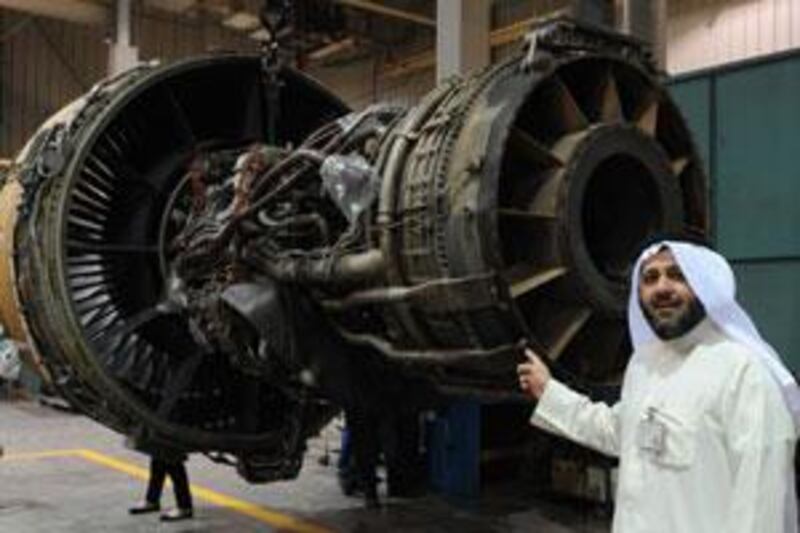KUWAIT CITY // Kuwait Airways Corporation (KAC) is calling for more money to buy new planes while moving to dispel perceptions that its ageing fleet is unsafe or badly maintained. The airline's image has recently taken a beating from members of parliament, with some suggesting the carrier is unsafe.
A YouTube video showing a KAC flight in a hard landing and another of passengers shaken and injured after their plane hit an air pocket have added to Kuwaiti suspicions that inadequate investment has left the national carrier ill-equipped and with poorly trained staff. The company responded with a press tour of its engineering facilities. "The newspapers are talking about Kuwait Airways and why we have old aircraft.
"This tour is just to explain that whether the planes are old or new, it is the maintenance [that is important]," said Ahmad Alebrahim, KAC's maintenance manager. "It's like your car. If you buy a new car, you will have three years without [paying for] maintenance. After three years, you will have to pay, but it's still working, still the same. "Air pockets and hard landings, these are things you can't escape from. They happen everywhere."
KAC staff showed off immense hangars that can service six planes simultaneously and a cavernous engine workshop at the company's headquarters in Kuwait City. The director of maintenance and overhaul, Khalil Hammadi, said the company followed internationally recognised safety standards and that planes from 55 airlines, including British Airways, Singapore Airlines and Lufthansa, were maintained by KAC in Kuwait.
By opening up to journalists, the company hoped to allay fears that its 17 Boeing and Airbus aircraft were too old. Airfleets.net, an online provider of information about the aviation industry, estimates KAC's aeroplanes are on average 15.9 years old, substantially more than the fleets of regional competitors such as Emirates Airline at 5.8 years, Etihad Airways at 3.2 years and Qatar Airways at 4.5 years.
The older planes are affecting the airline's competitiveness rather than its safety standards, Mr Alebrahim said. An airliner undergoes maintenance known as an "A check" every 500 flight hours, and this takes "about two days" for KAC's aircraft compared with five hours for newer models. Despite the airline's confidence in its safety standards, Khalid al Hulail, KAC's engineering director, said the company needed to invest in about 30 new aeroplanes.
He said the airline placed an order for new aircraft three years ago but that it fell through for "political" reasons. Wataniya Airways, the privately owned Kuwaiti carrier, stepped in to complete the deal, he said. KAC's privatisation was approved in parliament two years ago, but the details of its transformation to a private company are still under discussion. The airline says parliament, which approves its budget, is unwilling to provide money for new aeroplanes, preferring to let the burden fall on the private company when it is eventually established.
The loss-making airline's reputation received another blow this month when the government announced in parliament that it was investigating "financial and administrative violations" at KAC, and MPs used the session to question the airline's safety standards. One MP said Kuwaitis did not fly with Kuwait Airways because they were "afraid for their life". Some MPs say privatisation will risk Kuwaiti jobs, but an airline official who spoke anonymously said parliamentarians were more concerned with losing influence over the company, which they use to provide jobs for their supporters - a common practice known as "wasta".
Mr al Hulail said that the bureaucracy associated with government ownership was handicapping the airline and that privatisation would "very much" help the airline to be competitive. He said that at trade shows other carriers signed deals on the spot, while all he could do was "take the information, do my homework and follow the procedure". He illustrated the problem with the example of the in-flight entertainment system, which often experiences problems.
He said KAC spent five years trying to update the system and eventually gave up because of "government procedures". Privatisation would help the airline because "it will have a certain release of self-decision", Mr al Hulail said. jcalderwood@thenational.ae





